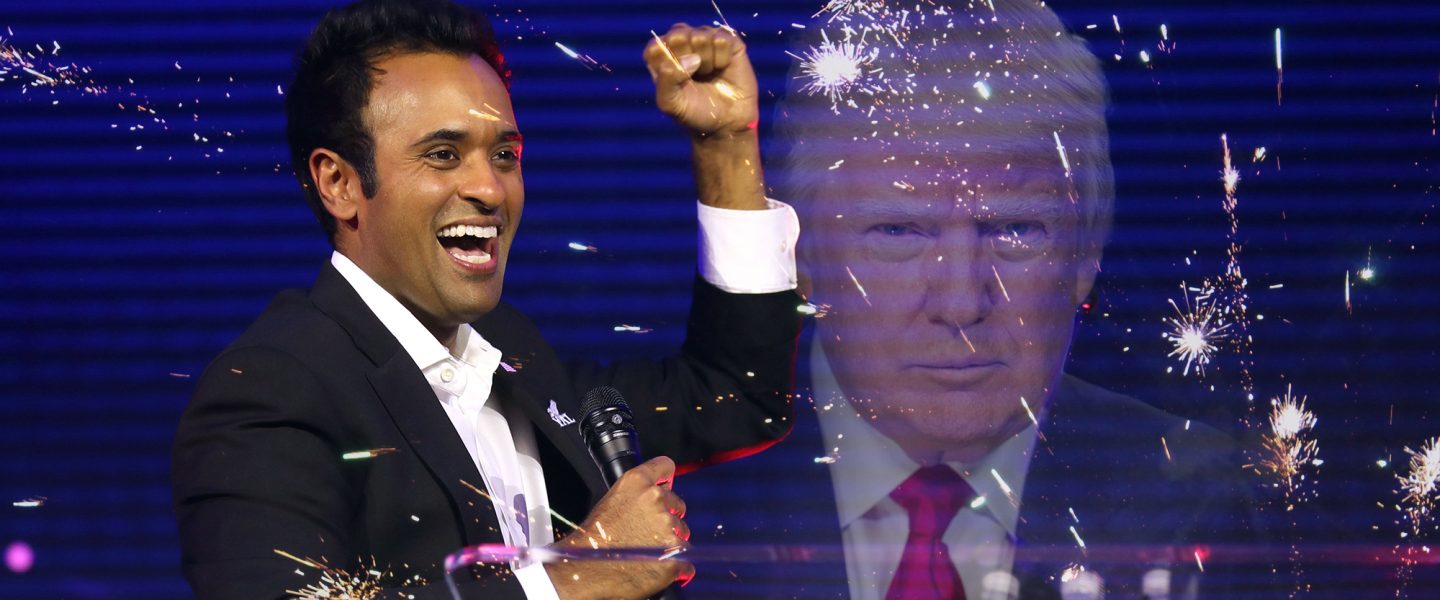What the Fox debate revealed about hatred, fear, and race
|
Listen To This Story
|
Note: As I was preparing to publish the essay below, with its discussion of race and the GOP, a young white man attempted to enter the campus of a historically black college in Jacksonville, Florida, but was turned away by a security officer after refusing to identify himself. He then went to a nearby discount store, where he shot and killed three black employees. “This shooting was racially motivated, and he hated Black people,” said Jacksonville Sheriff T.K. Waters.
It’s hard to contemplate what follows without considering the impact of GOP rhetoric on impressionable people like the perpetrator.
***
It’s been a few days now since the first GOP debate on August 23, and pretty much everyone has already weighed in with their performance assessment. The spectacle had an average of 12.8 million viewers, which, without their star, Trump, was a larger than expected audience.
Me, I’m still wrestling with a notion I couldn’t get out of my mind.
It struck me as emblematic of larger issues that, while discussed endlessly, never result in clarity: the kinds of people who want to lead us, how they present themselves — and what all this says about their voters and advocates.
Most of the contenders seemed to be auditioning for the role of apex predator — although they sometimes inadvertently morphed, however briefly, into a different, less alarming guise.
Let’s run through them quickly.
A few of the most marginal prospects among this field of also-rans didn’t really bother me. Call them the “friendly pastor” or “helpful teacher” type. Asa Hutchinson, a former prosecutor, sought to present himself as decorously as possible while ever so slightly blowing that omnipresent dog whistle that present-day Republicans seem to specialize in.
A bit more in-your-face but still recognizable as a traditional politician was another former prosecutor, Chris Christie.
Doug Burgum, the governor of North Dakota, worked even harder at sounding reasonable and tasteful, though he, like all of them, knew he had to toss some chum into the roiling waters for the sharks.
Nikki Haley came across as edgier but, as the only woman on the stage, she made a play for the women’s vote, pointedly differentiating herself on the abortion issue.
Tim Scott (“I really have no choice”) had something of an old-style Republican’s bearing, passing a certain test with Republicans skeptical of a Black man, sounding professional and unflappable. His biggest challenge was to act oblivious to the not-so-subtle racism on display — for example, in the opening video and in echoing comments about “Chicago,” other violent cities, and so on, all basically tying Biden and Democrats to urban chaos .
Oh, let’s not forget Mike Pence (preacher man with a secret side). Again, presenting himself as a responsible, pre-MAGA Republican, but in a really difficult position for having outraged the ever-Trumpers by doing the right thing on January 6.
And then we come to Ron DeSantis (“Yeah ready to go, whatever!”), still trying to be another Trump, but totally sidelined by the star of the show.
And that, for sure, was Vivek Ramaswamy.
With gallons of manufactured charisma and endless amounts of terrifying nerve, Mr. Slick on Steroids actually showed a propensity to be even more willing than Trump to say anything, no matter how nasty and untrue, to win the prize — which in his case seemed to be a nod as Trump’s vice-presidential running mate.
Pretty soon, Ramaswamy was being hailed as master of something called the “Gish Gallop.” (Trump and RFK Jr. are also considered experts in this.) The Gish Gallop is a disputational technique, named after the creationist Duane Gish, who was noted for spouting so many half-truths and no-truths in such a short period of time that opponents’ rebuttals couldn’t possibly keep pace.
Ramaswamy is truly a creature for today’s GOP: a complete figment of his own, entirely reactive, imagination — or perhaps ego. (That’s why Chris Christie said he “sounds like ChatGPT.”) And, indeed, Ramaswamy seemed at his best in gleefully avoiding anything he didn’t want to answer, while laying down a relentless barrage of punchlines — like a T-shirt cannon at a NASCAR meet.
One can imagine Ramaswamy — who, at 38, is the youngest candidate — employing a group of far younger people whose entire repertoire comes from recently discovered social media references they scarcely understand. And appropriating, however awkwardly, anything “cool” — like stealing Barack Obama’s famous line, marginally tweaked as “Who the heck is this skinny guy with a funny last name and what the heck is he doing in the middle of this debate stage?”
Over the last few years Ramaswamy apparently has changed his position on, well, just about everything, and whatever he currently claims almost certainly won’t stand up to scrutiny.
But then, that didn’t stop Trump either. And here’s why: A significant portion of America loves loves loves crazy and mean. If Trump’s burden of legal woes becomes too much of a liability, or if his out-of-control personality offends too many of the major donors and power-brokers, Vivek could come the closest to triggering those dark recesses of the MAGA mind.
Although I found this Trump-less Uncanny Valley deeply unsettling, I have to confess to also having felt overwhelmed by anxiety while watching previous GOP presidential debates. They always seem characterized by an undercurrent of ill-informed paranoia, inchoate suspicion, and a fear and loathing of “the other.”
But now, for sure, it’s at a whole new level. Back in the day, someone like Christie or Pence came across as mean and crabbed. Now, they seem the epitome of gentility, seasoned by a touch of reflection and candor.
Of course, they’re not the ones the audience wants. What the audience wants is the main game here: massaging the outrage G-spot of anger, resentment, fear, and victimhood.
To play, one must understand certain rules of the road:
- The GOP base hates complex ideas and intellectualism.
- Attention spans are short. Make your point in the length of a bumper sticker.
- Keep hammering on memes that exploit the base’s feelings of inadequacy, envy, and rage.
- The base frowns upon experience and credentials. They are ready to follow a total nobody with no qualifications as long as they are brash and entertaining.
- You can say anything you want about the “feared/hated” other, since it’s unlikely that your audience has ever interacted meaningfully with such people.
- You can say anything you want about almost anything, so long as you repeat it endlessly to “make it true.”
- Guard against inadvertent honest statements — or you will become irrelevant.
As the two hours on Wednesday night slogged by, I pondered whether there was any way to measure the actual level of dishonesty and deceit pouring through the screen. I wondered to what extent these people have talked themselves into believing whatever their latest line is. I mused how their families feel about this, what it must be like to share a breakfast table or a bed with a professional liar, having personally witnessed that person reverse course any number of times without so much as a twinge of conscience.
And always I kept thinking about Ramaswamy, from an immigrant family, with dark skin and that “funny name,” eager to feed the unreasoning anger of this crowd to gain their attention and something that feels like power.
But when the “debate” was over, I was left with one especially disquieting image, that of Tim Scott, who provided a kind of cosmetic cover to the racial fear and resentment boiling under the constant rhetoric about cities, and immigrants, and crime, and “woke.”
While Scott was giving this unsavory mix a spurious legitimacy, I thought about the new Black mayor of a small southern town, who has been subjected to all kinds of dirty tricks and hateful acts, which include being locked out of town hall, followed by drones, and nearly run off the road by a white man. His story is not unique.
In short, the GOP today is a gathering of the most ugly amongst us. It is not too far-fetched to think of it as a latter-day Klan rally, with a much broader set of grievances. The best of them are like those who personally were troubled by the Klan — but knew they had to play ball.
One does not have to be a partisan to see the urgent need to vigorously call out and reject what the Grand Old Party has become. It’s increasingly a matter of life and death — literally. Anyone in Jacksonville can tell you that.




